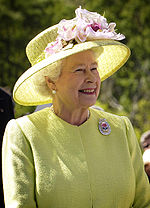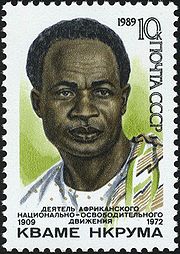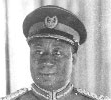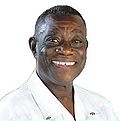
Heads of state of Ghana
Encyclopedia
Prior to independence in 1957, Ghana was known as the British colony of Gold Coast
. Before then it had been divided among a number of states, by far the largest of which was the Ashanti Empire
, whose rulers were known as the Asantehene.
Heads of State of Ghana
(Dates in italics indicated de facto continuation of office)
Gold Coast (British colony)
The Gold Coast was a British colony on the Gulf of Guinea in west Africa that became the independent nation of Ghana in 1957.-Overview:The first Europeans to arrive at the coast were the Portuguese in 1471. They encountered a variety of African kingdoms, some of which controlled substantial...
. Before then it had been divided among a number of states, by far the largest of which was the Ashanti Empire
Ashanti Empire
The Ashanti Empire , also Asanteman was a West Africa state of the Ashanti people, the Akan people of the Ashanti Region, now in Ghana. The Ashanti or Asante are a major ethnic group in Ghana, a powerful, militaristic and highly disciplined people of West Africa...
, whose rulers were known as the Asantehene.
Heads of State of GhanaGhanaGhana , officially the Republic of Ghana, is a country located in West Africa. It is bordered by Côte d'Ivoire to the west, Burkina Faso to the north, Togo to the east, and the Gulf of Guinea to the south...
(1957-Present)
(Dates in italics indicated de facto continuation of office)| Tenure | Portrait | Incumbent | Affiliation | Notes | |
|---|---|---|---|---|---|
| Ghana Ghana Ghana , officially the Republic of Ghana, is a country located in West Africa. It is bordered by Côte d'Ivoire to the west, Burkina Faso to the north, Togo to the east, and the Gulf of Guinea to the south... |
Unification of Gold Coast Gold Coast (British colony) The Gold Coast was a British colony on the Gulf of Guinea in west Africa that became the independent nation of Ghana in 1957.-Overview:The first Europeans to arrive at the coast were the Portuguese in 1471. They encountered a variety of African kingdoms, some of which controlled substantial... and British Togoland British Togoland British Togoland was a League of Nations Class B mandate in West Africa, under the mandatory power of the United Kingdom. It was effectively formed in 1916 by the splitting of the occupied German protectorate of Togoland into two territories, French Togoland and British Togoland, during the First... upon independence from Britain Great Britain Great Britain or Britain is an island situated to the northwest of Continental Europe. It is the ninth largest island in the world, and the largest European island, as well as the largest of the British Isles... |
||||
| 6 March 1957 to 1 July 1960 |
 |
Her Majesty Queen Elizabeth II Elizabeth II of the United Kingdom Elizabeth II is the constitutional monarch of 16 sovereign states known as the Commonwealth realms: the United Kingdom, Canada, Australia, New Zealand, Jamaica, Barbados, the Bahamas, Grenada, Papua New Guinea, the Solomon Islands, Tuvalu, Saint Lucia, Saint Vincent and the Grenadines, Belize,... represented by:- |
|||
| 6 March 1957 to 24 June 1957 | Sir Charles Noble Arden-Clarke, Governor-General | ||||
| 24 June 1957 to 1 July 1960 | William Francis Hare, Lord Listowel, the 5th Earl of Listowel William Hare, 5th Earl of Listowel William Francis Hare, 5th Earl of Listowel GCMG, PC , styled Viscount Ennismore between 1924 and 1931, was a British peer and Labour politician... , Governor-General |
||||
| Tenure | Portrait | Incumbent | Affiliation | Notes | |
| Republic of Ghana | |||||
| 1 July 1960 to 24 February 1966 |  |
Dr.h.c. Kwame Nkrumah Kwame Nkrumah Kwame Nkrumah was the leader of Ghana and its predecessor state, the Gold Coast, from 1952 to 1966. Overseeing the nation's independence from British colonial rule in 1957, Nkrumah was the first President of Ghana and the first Prime Minister of Ghana... , President |
CPP | Deposed in a coup d'état | |
| 24 February 1966 to 2 April 1969 |  |
Major-General Joseph Arthur Ankrah Joseph Arthur Ankrah Lieutenant General Joseph Arthur Ankrah served as the first commander of the Army of Ghana and from 1966 and 1969 as the second head of state.-Early life:... , Chairman of the National Liberation Council National Liberation Council The National Liberation Council was the name of the Ghanaian government after the elected government of the Convention Peoples' Party led by Dr. Kwame Nkrumah was overthrown on February 24, 1966. This government was in place till they handed over to a democratically elected government on October... |
Mil | ||
| 2 April 1969 to 3 September 1969 | Brigadier Akwasi Amankwa Afrifa Akwasi Afrifa Brigadier Akwasi Amankwaa Afrifa was a Ghanaian soldier, farmer, a traditional ruler and politician.He was the head of state of Ghana and leader of the military government in 1969 and then Chairman of the Presidential Commission between 1969 and 1970. He continued as a farmer and political activist... , Chairman of the National Liberation Council National Liberation Council The National Liberation Council was the name of the Ghanaian government after the elected government of the Convention Peoples' Party led by Dr. Kwame Nkrumah was overthrown on February 24, 1966. This government was in place till they handed over to a democratically elected government on October... |
Mil | Later General | ||
| 3 September 1969 to 7 August 1970 | Brigadier Akwasi Amankwa Afrifa Akwasi Afrifa Brigadier Akwasi Amankwaa Afrifa was a Ghanaian soldier, farmer, a traditional ruler and politician.He was the head of state of Ghana and leader of the military government in 1969 and then Chairman of the Presidential Commission between 1969 and 1970. He continued as a farmer and political activist... , Chairman of the Presidential Commission |
| | |||
| 7 August 1970 to 31 August 1970 | Nii Amaa Ollennu Nii Amaa Ollennu Raphael Nii Amaa Ollennu was the Chairman of the Presidential Commission and acting President of Ghana during the Second Republic from 7 August 1970 to 31 August 1970.-Early life:... , acting President |
||||
| 31 August 1970 to 13 January 1972 | Edward Akufo-Addo Edward Akufo-Addo Edward Akufo-Addo was a politician and lawyer in Ghana. He was one of the Big Six in the fight for Ghana's independence. He also became the Chief Justice and later President of the Republic of Ghana.-Education:... , President |
n-p | Deposed in a coup d'état | ||
| 13 January 1972 to 9 October 1975 | Colonel Ignatius Kutu Acheampong, Chairman of the National Redemption Council National Redemption Council The National Redemption Council was the ruling Ghana military government in from January 13, 1972 to October 9, 1975. Its chairman was Colonel I.K. Acheampong. He was also the Head of state of Ghana due to his chairmanship.-Duration of rule:... |
Mil | Later General | ||
| 9 October 1975 to 5 July 1978 | General Ignatius Kutu Acheampong, Chairman of the Supreme Military Council | Deposed in a palace coup d'état | |||
| 5 July 1978 to 4 June 1979 | Lieutenant-General Frederick Fred William Kwasi Akuffo Fred Akuffo Lieutenant General Frederick William Kwasi Akuffo was a soldier and politician. He is a former Chief of Defence Staff of the Ghana Armed Forces and the Head of state and chairman of the ruling Supreme Military Council in Ghana from 1978 to 1979... , Chairman of the Supreme Military Council |
Mil | Deposed in a coup d'état | ||
| 4 June 1979 to 24 September 1979 | Flight Lieutenant Jerry John Rawlings Jerry Rawlings Jerry John Rawlings is a former leader of the Republic of Ghana and now the African Union envoy to Somalia. Rawlings ruled Ghana as a military dictator in 1979 and from 1981 to 1992 and then as the first elected president of the Fourth Republic from 1993 to 2001... , Chairman of the Armed Forces Revolutionary Council Armed Forces Revolutionary Council, Ghana The Armed Forces Revolutionary Council was the government of Ghana from June 4, 1979 to September 24, 1979. It came to power in a bloody coup that removed the Supreme Military Council, another military regime, from power. The June 4 coup was preceded by an abortive attempt on May 15, 1979 when... |
Mil | born Jeremiah Rawlings John | ||
| 24 September 1979 to 31 December 1981 | Dr. Hilla Limann Hilla Limann Hilla Limann was the President of Ghana from 24 September, 1979 to 31 December, 1981. Eventually he became a diplomat, and served in Switzerland. Limann, whose original last name was Babini, was born in the northern Ghanaian town of Gwolu in the Sissala West District of the Upper West Region to a... , President |
PNP | Deposed in a coup d'état | ||
| 31 December 1981 to 7 January 1993 | Flight Lieutenant Jerry John Rawlings Jerry Rawlings Jerry John Rawlings is a former leader of the Republic of Ghana and now the African Union envoy to Somalia. Rawlings ruled Ghana as a military dictator in 1979 and from 1981 to 1992 and then as the first elected president of the Fourth Republic from 1993 to 2001... , Chairman of the Provisional National Defence Council Provisional National Defence Council The Provisional National Defence Council was the name of the Ghanaian government after the People's National Party's elected government was overthrown by Jerry Rawlings, the former head of the Armed Forces Revolutionary Council. This was on December 31, 1981. It remained in power until January 7,... |
PNDC | |||
| 7 January 1993 to 7 January 2001 | Jerry John Rawlings Jerry Rawlings Jerry John Rawlings is a former leader of the Republic of Ghana and now the African Union envoy to Somalia. Rawlings ruled Ghana as a military dictator in 1979 and from 1981 to 1992 and then as the first elected president of the Fourth Republic from 1993 to 2001... , President |
NDC | After retiring from the Armed Forces | ||
| 7 January 2001 to 7 January 2009 |  |
John Agyekum Kufuor John Kufuor John Kofi Agyekum Kufuor was the second president of the 4th Republic of Ghana and Chairperson of the African Union... , President |
NPP | Elected 28 December 2000 | |
| 7 January 2009 to Present |  |
John Evans Atta Mills, President | NDC | Elected 2 January 2009 | |
Affiliations
| PNP | Peoples National Party People's National Party (Ghana) The People's National Party was the ruling party in Ghana during the Third Republic .All political parties in Ghana were disbanded following the January 1972 military coup led by Col. Ignatius Kutu Acheampong. When political activities resumed in 1979, there were five parties contesting the... social democrat, Nkrumah personalist |
| NDC | National Democratic Congress National Democratic Congress (Ghana) The National Democratic Congress is a social democratic political party in Ghana, founded by Jerry John Rawlings, who was Head of State of Ghana from 1981 to 1993 and the President of Ghana from 1993 to 2001. The NDC was formed ahead of elections in 1992 and 1996 returned Jerry John Rawlings to... social democrat |
| NLM | National Liberation Movement National Liberation Movement (Ghana) The National Liberation Movement was a Ghanaian political party formed in 1954. Set up by disaffected Ashanti members of the Convention People's Party, who were joined by Kofi Abrefa Busia, the NLM opposed the process of centralization whilst supporting a continuing role for traditional leaders.... Asante regionalist 1954-1957, 1966- |
| NPP | New Patriotic Party New Patriotic Party -External links:*... liberal |
| PP | Progress Party Progress Party (Ghana) The Progress Party was the ruling party in Ghana during the Second Republic . In the 29 August 1969 elections, the PP won 105 of the National Assembly's 140 seats.... |
| CPP | Convention People's Party Convention People's Party The Convention People's Party is a socialist political party in Ghana, based on the ideas of former President Kwame Nkrumah.The CPP was formed in 1949 by Kwame Nkrumah to campaign for the independence of the Gold Coast. It ruled Ghana from 1957 to 1966... authoritarian, socialist, Nkrumah personalist, 1949-1966, 1960-1966 - only legal party |
| NAL | National Alliance of Liberals National Alliance of Liberals The National Alliance of Liberals was a political party in Ghana during the Second Republic . In elections held on 29 August 1969, the NAL won 29 out of 140 seats in the National Assembly.... 1966-1970 |
| Mil | Military |
| n-p | non-partisan |
| [ edit this box] | |
Sources
- http://www.rulers.org/rulg1.html#ghana
- Guinness Book of Kings, Rulers & Statesmen, Clive Carpenter, Guinness Superlatives Ltd
- African States and Rulers, John Stewart, McFarland
- Heads of State and Government, 2nd Edn., John V da Graça, MacMillan Press Ltd, 2000
See also
- GhanaGhanaGhana , officially the Republic of Ghana, is a country located in West Africa. It is bordered by Côte d'Ivoire to the west, Burkina Faso to the north, Togo to the east, and the Gulf of Guinea to the south...
- List of Ghana Heads of state by age
- Vice-Presidents of Ghana
- Heads of government of Ghana
- Colonial Heads of Ghana
- List of Ghana governments
- Lists of incumbents

